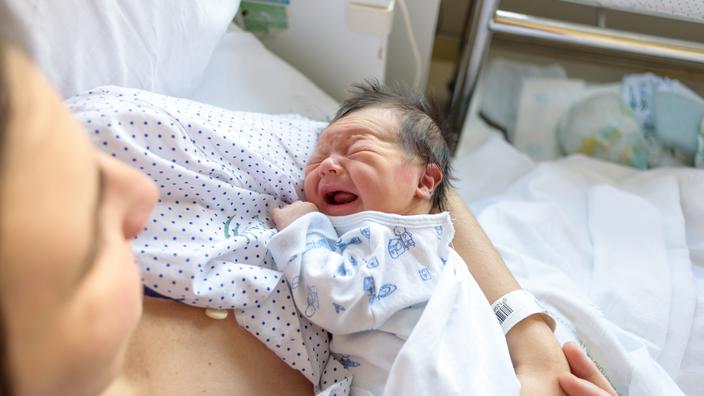The impact of the pandemic on the birth rate is now measured month by month.
In February, births started to rise again, but remained significantly lower than those observed a year earlier.
The birth rate fell by 5% between February 2020 and February 2021. According to still provisional civil status data, 52,100 babies were born in February, indicates INSEE.
Births "significantly fewer" than in February 2020 when they amounted to 56,600.
Read also: The Covid raises fears of a "baby crash"
"But 2020 being a leap year, the month of February 2020 counts one day more than the month of February 2021", notes INSEE.
The national statistics institute therefore prefers to compare the average number of births per day: 1,860 on average per day in February 2021 against 1,950 in February 2020. The sharp drop in births observed at the start of the year has therefore eased. .
“It is lower than the spectacular 13% drop in births in January, but it remains significant.
This resumption of births comes nine months after the end of the first confinement, with a conception in May 2020. This rise undoubtedly corresponds to a gradual resumption of parenthood projects at the end of this period ”, comments Sylvie Le Minez, head of the unit of demographic and social studies at INSEE.
"It is very difficult to make predictions because parenthood projects involve a large number of factors"
Sylvie Le Minez, Head of the Demographic and Social Studies Unit at INSEE.
Will the birth rate fluctuate with the health restrictions adopted to stem the pandemic?
Could this slight recovery continue, or even increase?
“It is possible but it is not guaranteed.
The period from May 2020 to August 2020 was marked by more hope for the French from a health point of view but the economic conditions were still difficult, analyzes Sylvie Le Minez.
The end of 2020 is darker with a second wave of deaths and new confinement.
It is very difficult to make predictions because parenthood plans involve a large number of factors ”.
Tenth year of decline in France
Beyond these monthly fluctuations, the health crisis will cause "a general drop in the birth rate throughout the year", underlines the geographer Laurent Chalard, member of the think tank European Center for International Affairs.
The birth rate will only be "more or less intense depending on the month depending on the health situation nine months earlier".
Read also: Birth rate in crisis: the baby blues of Covid-19
It is also part of a crisis of cradles rooted in time.
With a further decline in births (13,000 fewer in 2020), France has already experienced its tenth year of decline in birth rates in 2020 (or six years for the whole of France).
However, the desire for children "remains as strong as ever in France," says Unaf, which measured the number of French children dreamed of in a study carried out in January by the Kantar polling institute.
“The average number of children that individuals want or would have liked to have is 2.39 (no change since 2011), while fertility is much lower, and decreases over the same period, from 2 children per woman in 2011 , to 1.8 in 2020 ”, underlines Unaf, which calls for a relaunch of family policy.

